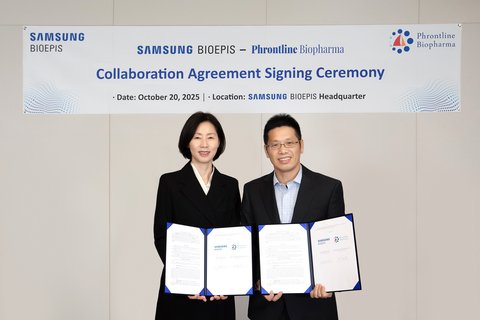Samsung Bioepis and Phrontline Partner to Develop Next-Generation Bispecific, Dual-Payload ADC Therapies for Solid Tumours
22 October 2025 | Wednesday | News

Kyung-Ah Kim, President & CEO of Samsung Bioepis (left) and Zhaoyuan ‘Tony’ Chen, Founder and CEO of Phrontline Biopharma (right) have signed a global strategic partnership agreement to advance development of antibody-drug conjugate (ADC) therapeutics for solid tumors.
- Samsung Bioepis and Phrontline will co-develop two investigational antibody-drug conjugate (ADC) assets directed against targets expressed in a broad range of cancers
- Collaboration will add a new class of bispecific and dual-payload ADC therapeutics to Samsung Bioepis’ oncology portfolio
- Phrontline will be responsible for creating bispecific, dual-payload ADCs using its bispecific antibody and dual-linker payload (DLP) platforms
- Samsung Bioepis receives an exclusive license from Phrontline for one TOP1i payload for development, manufacturing, and commercialization of ADC therapeutics
Phrontline’s TJ108 is TOP1i and tubulin inhibitor-based ADC directed against Epidermal Growth Factor Receptor (EGFR) and Human Epidermal Growth Factor Receptor 3 (HER3), targets that are overexpressed in a variety of cancers, which contribute to aggressive growth and metastasis.i,ii
Under the terms of the agreement, Phrontline will receive an upfront payment and will be eligible to receive additional milestone payments tied to development and regulatory achievements.
“We are excited to partner with Phrontline in developing and advancing differentiated ADCs that target a broad range of indications,” said Kyung-Ah Kim, President and Chief Executive Officer, at Samsung Bioepis. “We will continue to explore new business opportunities to address unmet needs of patients, leveraging our proven development platforms.”
“Phrontline has honed its bispecific targeting technology to enhance payload delivery efficiency and has advanced an innovative dual-linker payload (DLP) platform that enables the simultaneous delivery of two payloads with balanced potency and distinct mechanisms of action through a branched-linker architecture, while supporting scalable and efficient one-step conjugation. This partnership accelerates our vision to establish bispecific, dual-payload ADCs as a new class of precision oncology medicines,” said Zhaoyuan ‘Tony’ Chen, Founder and Chief Executive Officer of Phrontline Biopharma. “Together with Samsung Bioepis, we will scale the DLP platform — beginning with TJ108 — to address resistance, heterogeneity, and durability challenges that limit today’s single-payload, single-target ADCs.”
Samsung Bioepis is expanding its pipeline beyond biosimilars to fulfill its mission of broadening patient access to treatments in the areas of unmet therapeutic needs. The development of ADCs could add into the company’s broad spectrum of therapeutic portfolio that covers immunology, oncology, ophthalmology, hematology, nephrology, neurology, and endocrinology.
Most Read
- Innovations In Magnetic Resonance Imaging Introduced By United Imaging
- Management of Relapsed/Refractory Multiple Myeloma
- 2025 Drug Approvals, Decoded: What Every Biopharma Leader Needs to Know
- BioPharma Manufacturing Resilience: Lessons From Capacity Expansion and Supply Chain Resets from 2025
- APAC Biopharma Review 2025: Innovation, Investment, and Influence on the Global Stage
- Top 25 Biotech Innovations Redefining Health And Planet In 2025
- How Health Systems Are Reshaping Drug Adoption, Partner Models, and Market Access in 2026
- The New AI Gold Rush: Western Pharma’s Billion-Dollar Bet on Chinese Biotech
- Single-Use Systems Are Rewiring Biopharma Manufacturing
- The State of Biotech and Life Science Jobs in Asia Pacific – 2025
- Asia-Pacific Leads the Charge: Latest Global BioSupplier Technologies of 2025
- Invisible Threats, Visible Risks: How the Nitrosamine Crisis Reshaped Asia’s Pharmaceutical Quality Landscape
Bio Jobs
- The State of Biotech and Life Science Jobs in Asia Pacific – 2025
- Avantor’s New CEO Ligner Aims to Unlock Global Potential and Deliver Shareholder Value
- AstraZeneca Commits $50 Billion to U.S. Expansion by 2030 in Biggest-Ever Global Investment
- Thermo Fisher, SAMRC, and South Africa’s Department of Science and Innovation Launch CATIR to Nurture Next-Gen Scientists
- Cube Biotech Appoints Former Sartorius CEO Dr. Joachim Kreuzburg to Board of Directors
- FDA’s AI Transition Marks a Turning Point in Drug Review: Industry Faces Pressure to Adapt Amid 20% Workforce Cut
- WuXi XDC Completes Mechanical Build of Singapore Bioconjugate Manufacturing Hub
News
Editor Picks











